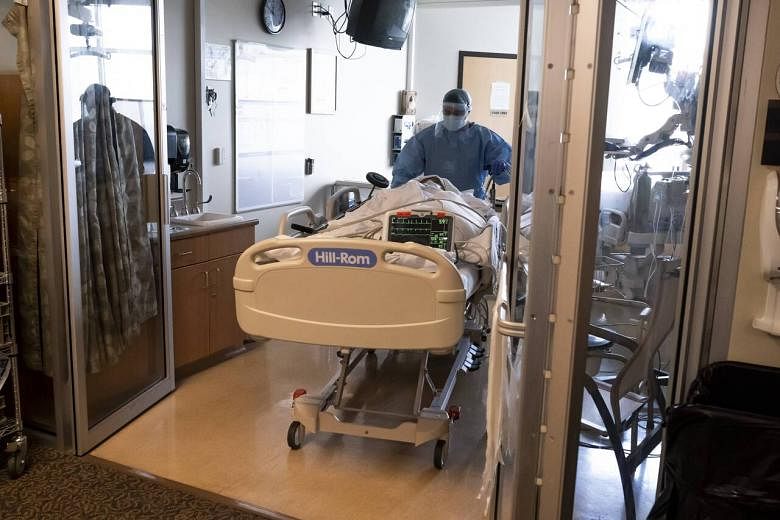NEW YORK (NYTIMES) - The death of former US secretary of state Colin Powell on Monday (Oct 18) from complications of Covid-19 has provided fuel for vaccine sceptics and opponents, who immediately seized on the news that Mr Powell had been vaccinated to stoke doubts about the effectiveness of the vaccines.
But Mr Powell's immune system had quite likely been weakened by multiple myeloma, a cancer of white blood cells. Both the disease and the treatment can make people more susceptible to infections.
His age, 84, may also have increased his risk, scientists said.
Mr Powell received his second dose of the Pfizer-BioNTech vaccine in February, said long-time aide Peggy Cifrino. He had been scheduled for a booster last week but fell ill before he received it, she said.
Mr Powell had also undergone treatment for early-stage Parkinson's disease, she said.
Although Mr Powell's death is a high-profile tragedy, scientists emphasised that it should not undermine confidence in the Covid-19 vaccines, which drastically reduce the odds of severe disease and death.
"Nothing is 100 per cent effective," said Dr Paul Offit, director of the Vaccine Education Centre at Children's Hospital of Philadelphia. "The point of getting a vaccine is that you want to know that the benefits clearly and definitively outweigh the risks. And we know that for this vaccine."
The vaccines are highly effective, even against the more contagious Delta variant, which is now responsible for nearly all coronavirus infections in the United States. People who are fully vaccinated are roughly one-tenth as likely to be hospitalised and even less likely to die from Covid-19 as those who are unvaccinated, according to a recent study from the Centres for Disease Control and Prevention (CDC).
A New York Times analysis of data from 40 states found that fully vaccinated people have accounted for 0.2 per cent to 6 per cent of Covid-19 deaths.
Among the more than 187 million Americans who have been fully vaccinated, there have been 7,178 deaths, according to the CDC. Some 85 per cent of those deaths have involved people 65 or older.
"Breakthrough deaths with vaccinated individuals do occur," said Dr Peter Hotez, dean of the National School of Tropical Medicine at Baylor College of Medicine in Houston. "But there are certain groups that are at greater risk."
Since the beginning of the pandemic, it has been clear that older adults are the most likely to develop severe Covid-19. They also have less robust immune systems in general and mount a weaker immune response to the vaccines.
In one recent study, which has not yet been reviewed by experts, researchers found that residents of Canadian long-term care homes, who had a median age of 88, produced levels of neutralising antibodies roughly fivefold to sixfold lower after vaccination than did staff, who had a median age of 47.
"This puts them at risk for not only getting infected by Covid-19 but also having severe consequences," said Dr Anne-Claude Gingras, a senior investigator at the Lunenfeld-Tanenbaum Research Institute at Mount Sinai Hospital in Toronto and lead author of the study.
Mr Powell had also undergone treatment for multiple myeloma, a cancer of plasma cells, which are a type of white blood cell. Plasma cells make antibodies and thus play a critical role in the immune system.
Both the disease and the treatment - which may include chemotherapy, immunotherapy and steroids - can leave patients more vulnerable to infections.
"Colin was undergoing treatment for multiple myeloma but seemed to be responding well," Ms Kathy Giusti, who founded the Multiple Myeloma Research Foundation and met Mr Powell when he spoke at a foundation event, said in a statement.
"Immunosuppression is a well-known side effect of cancer treatment and a reminder that as patients, we are at high risk, especially if also over 65 years of age."
Vaccines are also likely to be less effective in people with multiple myeloma.
"The treatments we're using are indiscriminately knocking off both the malignant and the normal immune cells," said Dr James Berenson, medical and scientific director of the Institute for Myeloma and Bone Cancer Research in West Hollywood, California.
That puts patients "at double risk for getting no response to a vaccination and also not responding as well once they get the disease", he added.
In a new study, which was scheduled to appear on Monday in the journal Cancer Cell, researchers report that some people with multiple myeloma also have weak T cell responses after vaccination. T cells can help reduce the severity of disease in people who contract the virus.
The study included 44 people with multiple myeloma who were at least two weeks past their second Pfizer or Moderna shot.
Seventeen of those people produced no detectable antibodies against the virus after vaccination. These patients had significantly fewer helper T cells, which activate other parts of the immune response to the virus, compared with multiple myeloma patients who had produced antibodies after vaccination.
The good news, said Dr Samir Parekh, a haematologist at the Icahn School of Medicine at Mount Sinai Hospital in New York City and who led the research, is that research suggests that booster shots "are looking extremely promising" for people with multiple myeloma.
"Patients who haven't received them should do that immediately," he said.
The best way to protect older adults and others with compromised immune systems is for everyone else to be vaccinated, said Dr Ashish Jha, dean of the Brown University School of Public Health.
"When there are large numbers of infections happening in the community, it spills over into vaccinated people," he said. "And the vulnerable are really at risk."

